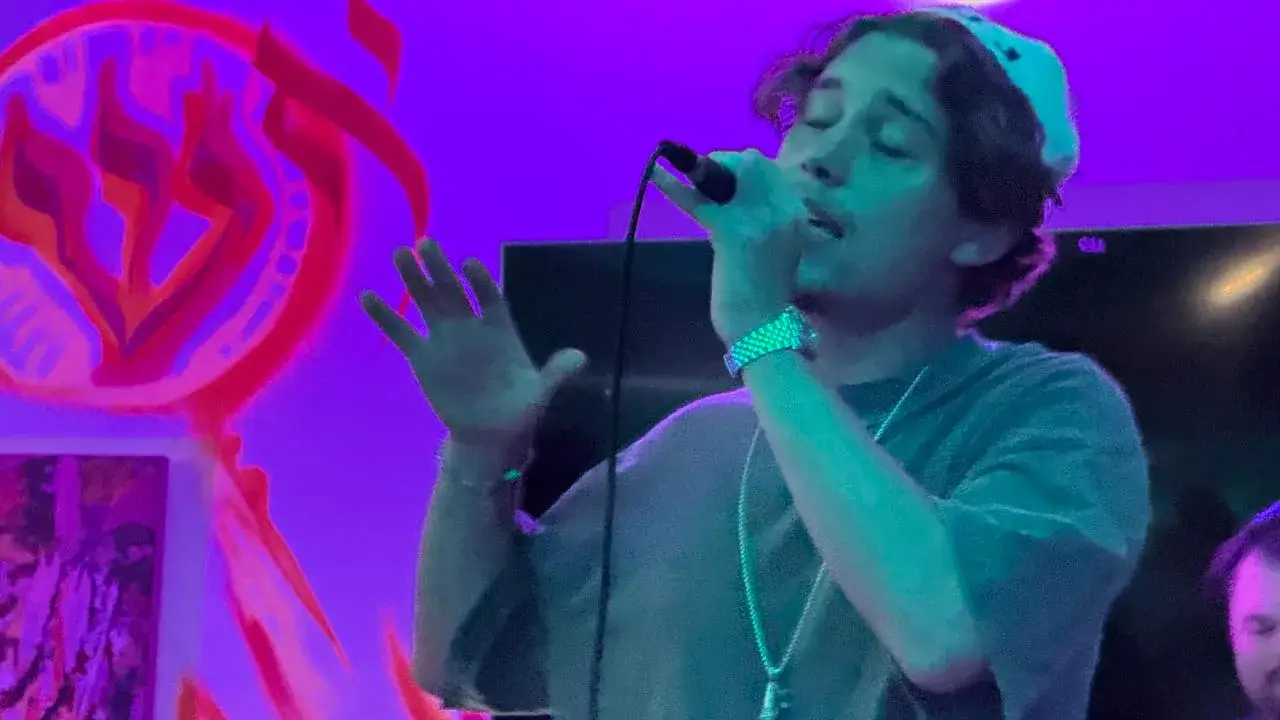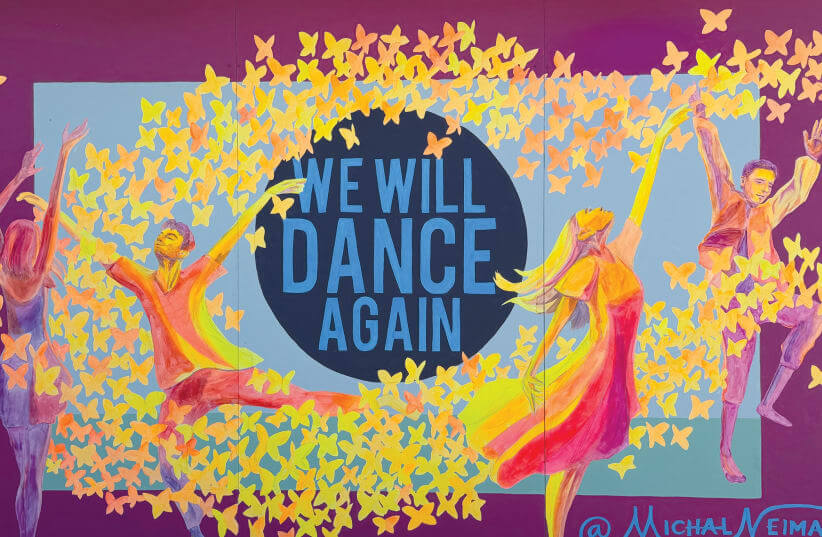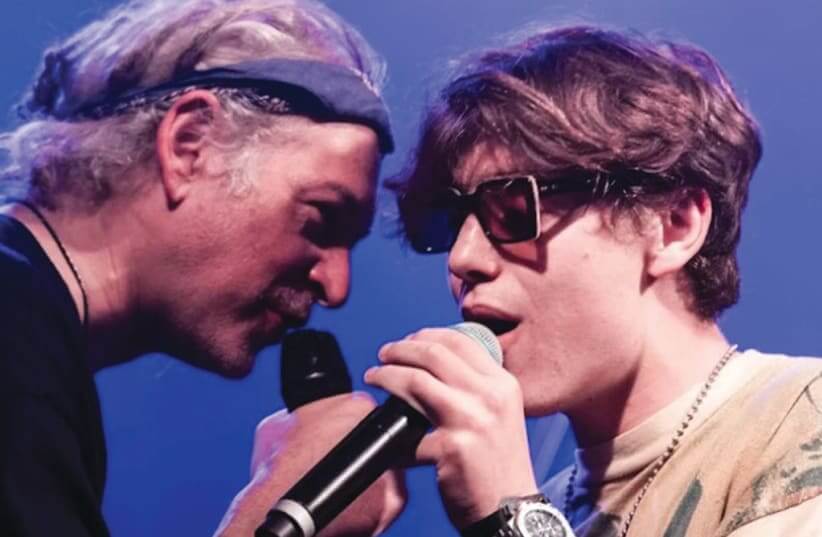Laivy Miller, the son of famed American-Jewish reggae/rapper Matisyahu, performed in Tel Aviv along with his younger brother, Duvbear.
Everything was ‘sababa’ at NJ Jewish music fest
Original article was published on The Jerusalem Post
Sababa attendees had the opportunity to experience the best aspects of a traditional music festival while also sampling workshops and merchandise from vendors.
In many ways, the four-day Sababa Music Festival in Hammonton, New Jersey, was like other music festivals – top bands on many stages, vendors, barbecues, merch, camping, cornhole, yoga, frisbee, lake swimming, alcohol, some recreational drugs, people milling about barefoot, and unlimited opportunities to socialize with old and new friends.
But Sababa, held this year on June 27-30 and nearly every year since 2017 at a number of locations in the New York area, is quite unique. The 1,300 festival attendees were almost exclusively Jewish. They came together from extremely diverse backgrounds and locations such as New York, New Jersey, Maryland, Pennsylvania, Texas, Wisconsin, Arizona, Canada, and Israel. Some were looking to get closer to traditional Judaism and enjoyed putting on tefillin (phylacteries) for the first time. The large group of Rabbi Nahman of Breslov followers blasted music, danced, and shared soup with anyone who visited their large “Nanachville” village.
This year, there was added significance to many of the attendees due to connections to music festivals, particularly the Nova Festival, which took place last Simchat Torah in Israel and was among the targets of the October 7 Hamas massacre, resulting in hundreds of celebrants’ deaths.
When Riverdale resident Barry Kanner visited The Nova Music Festival Exhibition – The Moment Music Stood Still recently in New York, he knew instantly that he needed to participate in the Sababa festival.
“While fighting back the nausea and tears, there was one thought that gave me solace,” he said. “It was my plan to be at Sababa, where, as a proud Jew, I will counter evil, blind hatred, and darkness with friendship, celebrating Shabbat and great music. We will dance again!”

Veteran concert promoter Peter Shapiro, owner of the Brooklyn Bowl and The Capitol Theater, shared Kanner’s sentiments about the need to dance again. “The only way to pick ourselves back up from the terrible trauma that October 7th has caused for all humans is to dance again, so I am very much looking forward to how we can pick up the pieces through the spiritually replenishing magic of a live music festival.”
The themes of love for Israel and “dancing again” were everywhere. Many tents and campsites featured Israeli flags and the Nova festival; enthusiastic fans waved the flags as Matisyahu, who has done so in Israel since October 7, performed “One Day” and “Jerusalem.”

Artist Michal Neiman created a large, colorful “We Will Dance Again” mural featuring 364 butterflies that were filled in by attendees with the names of people murdered at the Nova Festival.
Neiman, 27, a nurse and artist who also constructed a whimsical Shabbat Table in a covered tent, where attendees could go for solace throughout the festival, noted that “we have all been thinking about Nova and will, at some point, while here.” For that reason, she decided to create a “visual tribute.” Participants chose file cards with names of the Nova victims, which they wrote on blank butterflies on the exhibit, and kept the file cards for remembrance. “Everyone could pick a card and hold on to it and dance with it,” Neiman said.
Harrison Ferber and his fiancée, from Lower Manhattan, picked a blue card and added the names of Lori Vardi, 26, of Raanana, and Einav Elkayam Levy, 32, of Givatayim. They were proud to write the names inside the butterflies and take the cards home with them to continue remembering the victims.
SABABA ATTENDEES had the opportunity to experience the best aspects of a traditional music festival while also sampling workshops and merchandise from vendors. The musical offerings kicked off Thursday with Mun on the main stage and Chillz/Jammz at the bonfire stage.
Others were looking for their place in the Jewish world as they moved beyond haredi Judaism. A 20-something woman in shorts and a t-shirt was speaking with another attendee in Yiddish, describing her Satmar background. Another man was telling a new friend that he grew up ultra-Orthodox in Baltimore and remained religious “until five years ago.”
Liba Yoffe, who led a Saturday afternoon workshop on “Breaking the Chains of Fear,” is a formerly religious, divorced mother of four who shared her story of being the first woman to compete on the TV show American Ninja in a long dress and wig. A blonde, American-born 20-something, draped in an Israeli flag throughout the weekend, described herself as living “somewhere in Gush Etzion” where she “does farming.”
Friday’s musical highlights, which went from 1:30 pm until just before 8:13, the time for Shabbat candle-lighting, included rapper Kosha Dillz, who also led a Shabbat day workshop on “How to Become a Jewish Rapper in 57 Minutes,” Souls on Fire, Top Cats, a versatile Grateful Dead cover band, and others.
On Friday, following optional morning prayers, the Zen Zone featured communal shakshuka cooking with chef Nir Margalith and pre-Shabbat shakshuka tasting to raise awareness of Havat Marpe (Healing Space), located in Rishpon, Israel, and its unique, integrated response to collective trauma “Our organization wants to support Nova. We have hosted 3,500 survivors so far,” he said. Their work has also impacted young adults from Kibbutz Re’im, 2,300 combat soldiers, and others. They expect to help 28,000 by the end of 2024. Margalith, a chef who has worked in the tourism industry, is traveling to America every six weeks to cook at private events that raise money for the organization.

Pre Shabbat events featured a healing session with Tamar, team-building activities with Shilo, Kabalah Yoga, and a Wrapunzel head-wrapping workshop.
While many came to Sababa for the music and workshops, many elected to spend a great deal of time socializing and hosting dance parties and dining events in specially designated camping villages with names such as The Persian Peninsula, The Jungle, The Chevre (Philadelphia-area young professionals), Burning Heart/Vallevue, and Nanachville.

AS SHABBAT approached, some lined up for the modern showers trucked in for the event. Others continued dancing, swimming, and hanging out. For the fully Sabbath-observant, an extensive eruv (enclosure) was constructed to permit carrying, and a sophisticated apparatus was built to constantly replenish hot water, thereby enabling the drinking of hot coffee on Shabbat.
A spirited song-and-dance-filled Kabalat Shabbat (Welcoming of Shabbat) took place after candle lighting near the main stage; no one seemed in a rush to get to dinner, and it continued until 10 p.m. Everyone then proceeded to the packed dinner tent, where there was ample and tasty food for all 1,300 guests. It was still rocking well past midnight, when two recently married couples celebrated Sheva Brachot (the “Seven Blessings” recited over wine during the wedding ceremony, after the wedding feast, and following festive meals during the next seven days). The festival organizers were proud that 15 couples have married after meeting at previous Sababa festivals.
On Shabbat morning, Rabbi Shraga Sherman of Chabad of the Main Line (Philadelphia) and father of Mendel Sherman, one of the organizers, delivered an optional 10:30 am class on hassidism, followed by traditional davening and an equally well-attended yoga session.
There was something for everyone on Shabbat day, including workshops by Spirit Fit Life founder Liba Yoffe, Kosha Dillz, presenters on Jewish comedy and Jewish poetry, a panel on second chances, and a popular, interactive session on self-defense. The lake was open for swimming, and at least one young married couple was observed fighting and the wife crying. They apparently worked hard to resolve their differences and were seen holding hands while walking away.
Those who were not fully Sabbath observant were asked to respect the sanctity of the day for those who were. No one seemed to object to those who chose to enhance their Shabbat with barbecues or weed smoking.
Live music took a break over Shabbat, though it resumed promptly as the sun went down with a spirited 10 p.m. musical havdalah (end of Shabbat ceremony) and bonfire with Binyomin Lerner at the Bonfire Stage. The music continued all night long on both the Bonfire Stage and the Main Stage. Headliner Matisyahu had the crowd singing, dancing, and waving Israeli flags as he performed from 12 midnight until1:30 a.m., accompanied by one of his sons for two of the songs). The other headliner, Zusha, took to the stage at 2:15 a.m.; the crowd was not bothered by the rainstorm, including thunder and lightning, as the remaining performers, Levyticus and FreeJ, were still scheduled for sets at 4 and 5 a.m.
Matisyahu was excited to perform, and he appreciated just how different Sababa is from most other events.
“After 10/7, there has been a shift in the world. We are more united now as a Jewish people. Obviously, some Jews are running in the opposite direction. For many, coming together is very important. Sababa is a perfect example. Jewish bands, Jews from different walks of life, camping, Shabbat. It’s a chance to experience a real sense of ahdut (unity), healing, and empowerment that we are all desperate to have now,” he said.
Festival co-founder Mendel Sherman, 31, describes himself as “always out of the box and not fitting the mold.” He always loved music but never found a “creative outlet.” However, a Phish concert that he attended in 2012 was life changing for him. “It lit a fire under me,” said Sherman. “We need to do this in the Jewish world – a fusion to tie it all together.” Friends introduced him to Alter Deitsch. and the first Sababa was born in June 2017. “It snowballed from there,” noted Deisch, 33, as the two described the growth and evolution of Sababa.
Deitsch, who was content to simply “have a lot of fun around music and camping,” said they “realized, after the first year, that it is way deeper; people from different cultures start to meet.” He proudly shared the story of a shidduch (matchmaking) that occurred in the first event between “people who wouldn’t have met” otherwise. He used the word “cross-pollination” to describe what takes place regularly at Sababa. “There is real interconnection and pollination of all types of Jews,” he said.
Deitsch and Sherman feel their job is “to set the ground for people to be comfortable and to be their fullest selves, with no judgment, within Judaism.” In the wake of Nova, their conviction was strengthened that “Sababa has to be Sababa. The need for this has intensified.”
Participants have been home already for days and continue to post in the Sababa WhatsApp group and Instagram, and many are still proudly wearing their festival bracelets. And they are discussing next year’s festival and other meaningful opportunities for Jews to gather together.
Sababa has danced and will dance again.
Laivy Miller follows in the big footsteps of his father, Matisyahu
The original article is published at JPost.com
“My dad taught that music is giving and that we have to be a vessel if you have it – everything is from Hashem. If God gives you the gift of a voice, it is for a reason.”
Laivy Miller can only laugh when people ask him about his Instagram posts with frequent comments by Jewish rapper and former hassid Matisyahu.
“They ask, ‘how do you know him?’ and I tell them ‘it’s my Dad!’” said the 18-year-old singer who professionally simply goes by Miller.
Living in Israel, Miller is making his mark with collaborations with top Israeli performers, performing with his father earlier this year at the International Convention Center (Binyenei Hauma), competing in the next season of Hakochav Habah, and launching a bright musical future.
Runs in the family
Matisyahu spotted Miller’s talent, interest in music, and determination at a young age.
“He grew up spending a big portion of the time on the tour bus, at venues, in the green groom, hotels, around the stage, packing up. It was always comfortable for him. He got a passport at age two and went with us as a baby to South Africa, Australia, and Europe,” Matisyahu recalls. “He always had a super powerful voice – at 3, in Crown Heights at 770 [Chabad Lubavitch World Headquarters], his voice soared over the top.”
Miller thinks his interest in music may date back to before he was born.
“Right out of the womb, my dad was beatboxing next to me in the hospital,” he told The Jerusalem Post from Jerusalem’s Old City, where he has been living.
Miller recalls loving music from a young age.
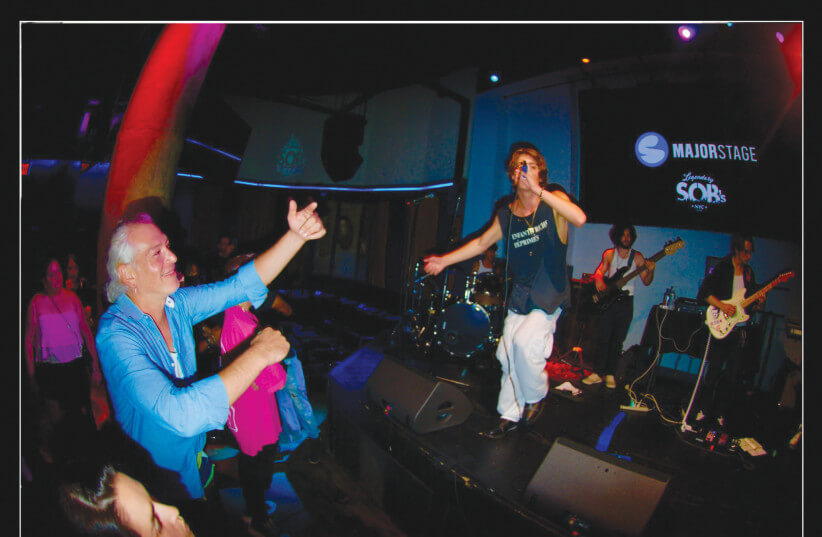
MATISYAHU ENJOYS a performance by his son in New York. (credit: Raise Fist Propaganda )
“I would always sing with my action figures and do creative songs,” he said, adding that his father supported his interest in music, bringing him on stage at age three and setting up a small red drum set next to the band’s drummer.
“I would always be sidestage at his shows, singing along.”
Miller treasures the accepting, encouraging, and supportive attitudes he encountered growing up on the road with “wild musicians” who were “diverse” and “not your average crowd.”
“People taught me to embrace my passions and complete my dreams. These days, that is not a priority as people follow stiff plans over dreams.”
The COVID pandemic may have inadvertently helped Miller pursue his dreams. Not taking well to Zoom learning, he downloaded Garage Band on his Mac and learned to make and produce demos.
“When I showed them to my dad, he liked them and thought I should show them to a real studio,” he said.
Matisyahu offers a slight clarification of how Miller’s songwriting career started.
“One day he went up to the attic, opened his laptop, and started working on music. He wanted Logic [Logic Pro for Mac – a proprietary digital audio workstation developed by Apple Inc.]. I told him to learn Garage Band first. He came down with a track after a few months. ‘You did a good job. Let’s do it if you want.’ He started coming to all of my recording sessions.”
Matisyahu thinks Miller has a wide range of skills that may help him make it big in the music world.
“He was always a strong talent – connecting with people, street smart, a good judge of character, always motivated, a tough [hockey-playing] kid – fending for himself a lot in Crown Heights.”
In addition, Dad reports proudly, “He is an incredible kid with a huge heart. A real love for music and for the people in his life. A special human being and talented artist. He is willing to be coached and he is a good learner. He creates emotions and he is a deep thinker.”
Miller, out of respect for his traditionally Jewish observant mother, agreed to spend the year studying in a yeshiva in Israel. After experimenting with two different programs, he gravitated to full immersion in the music world and is now back to balancing his studying and music. He is working with Doli and Penn, a top Israeli songwriting and production duo who produce famous Israelis such as Omer Adam and Eyal Golan. In addition, Miller, Matisyahu, Doli and Penn, and Ishay Ribo are working on a song together.
“I got cast for Hakochav Habah [The Next Star]. I am in final auditions now,” said Miller, adding “If I win, I get to represent Israel at Eurovision, which is something I really want to do. I think it would be incredibly cool to represent the country.”
Matisyahu is pleased with Miller’s decision to come to Israel and to remain during this challenging year.
“He wanted to learn and has found himself in Israel,” says Matisyahu, noting that there was some pressure from managers and others in the music business for him to stay in the US this year. “He has really found himself during this transformative year for all Jews in the world.”
Matisyahu and Miller have been outspoken and unwavering in their support for Israel.
Miller sounds rabbinic as he thanks his father for teaching him to appreciate the musical gifts he has.
“My dad taught that music is giving and that we have to be a vessel if you have it – everything is from Hashem. If God gives you the gift of a voice, it is for a reason.”
As Miller continues, he sounds wise beyond his 18 years.
“If you are in a position of giving, you must give as much as you possibly can.”
Miller is already at the point of people recognizing him around Israel.
“If I have opportunities and people recognize me in the street, I have to remember it is not about me. I have to be a vessel and good things will come.”
Miller also appreciates that his father taught him to be humble and to control his anger.
“You need to block anger out to be humble. If you are calm and positive, you don’t get angry.”
Miller lists a wide range of musical influences including Kid Cudi, Drake, Justin Bieber, Glaive, The Beatles, and the music his father listened to while he was growing up, including Bob Marley and jam bands.
In addition to inviting his father to join him on stage at his own concerts, he has recently opened shows for his dad in Tel Aviv and Jerusalem.
“It is cool being on stage with your father. I loved sharing the stage with him and pulling him up for my original songs. He is the one who inspired me to do all of this, to share the stage and sing together has always been a dream!”
Miller has released eight singles to date and two videos – “Peace Of Mind” and “Serenity.” Miller attempts to describe the type of music he creates.
“I think my music is pop, at the end of the day. It incorporates a lot of styles – jazz, indie, and rock.”
He is signed with 10K Projects for a distribution deal. He is considering releasing an EP this summer.
Miller said he will put out “single after single for a while – until I have a true core fan base.” He describes current fans as “teens to older people.”
Miller is particularly proud of his recent activism. He and Matisyahu performed at MIT in the We Will Dance Again Festival. “It was super cool to meet Idan Raichel – I am a big fan of his music,” notes Miller.
He also performed at a recent ZOA event in Times Square.
“It is cool to be a voice of the youth!”
Seeing the Light: Up close and personal with Hassidic Hip-Hop star, Matisyahu
Original Article published in The Jerusalem Post
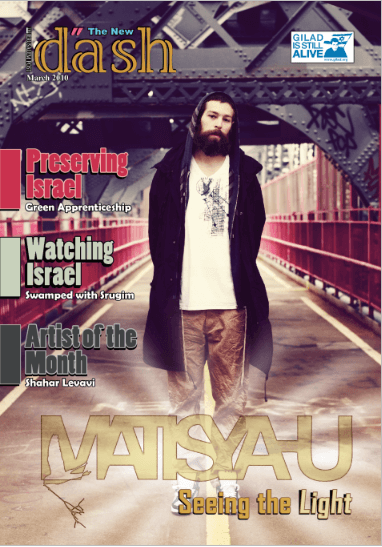
Matisyahu beats and breaks across the stages of the world with his long beard and ritual fringes flapping. His music can best be described as a cross between
reggae, Rasta Roots, rap, rock, beat boxing, dub and Hasidic nigunim which are sung in English, sprinkled with bits of Hebrew and Yiddish throughout. His fan base spans the young religious crowd, to hardcore reggae fans, to those simply intrigued by the idea of a rappin Hasidic Jew.
This past December, Matisyahu returned to New York City for the annual Chanukah Festival of Lights shows – four in Manhattan and four in Brooklyn. Matisyahu performed songs from his new album, Light, as well as such classics as King Without a Crown and Jerusalem from his albums Shake Off the Dust… Arise (2004) and Youth (2006). Fans were in for a treat during the show as a silver, sparkly, three-foot-tall revolving dreidel descended from the rafters. Several lucky fans in the packed club even got to join Matisyahu on stage to light the Chanukah candles. As Matisyahu got warmed up, he shed his black jacket, revealing a white jumpsuit with the Hebrew letter aleph on the back.
Matisyahu was born Matthew Paul Miller in Westchester, Pennsylvania. He moved to New York, attended Hebrew school at a Reconstructionist synagogue, and became bar mitzvah at Temple Beth Am Shalom in White Plains. In 1996, when Matisyahu was 16, he attended the Alexander Muss High School Program in Hod Hasharon, near Tel Aviv, in Israel. I loved it, he said. It was my first experience in Israel. I remember the day they took us to Mount Scopus, overlooking the Old City of Jerusalem. I was deeply touched when we sang ‘Yerushalayim Shel Zahav – Jerusalem of Gold. It was the first time in my life I had an emotional feeling about being Jewish.
Matisyahu has returned to Israel many times since, having grown a great deal both musically and spiritually. As a teen, Matisyahu discovered his parents record collection, and his talent for singing. He was instantly turned on to the music of legendary groups such as the Grateful Dead, Phish and Bob Marley and the Wailers. Matisyahu also became increasingly interested in his religion, ultimately becoming Ba’al Teshuva in 2001. The result is an incredible career which seems to balance his musical and spiritual needs together on stage, to the delight of fans worldwide.
In 2005, Matisyahu recorded Live at Stubb’s in Austin, Texas. He then toured extensively throughout the United States, Canada, Europe and Israel. In 2006, his second album, Youth, was Billboard magazine’s number one digital (most downloaded) album. His third album, Light, was released on August 25, 2009.
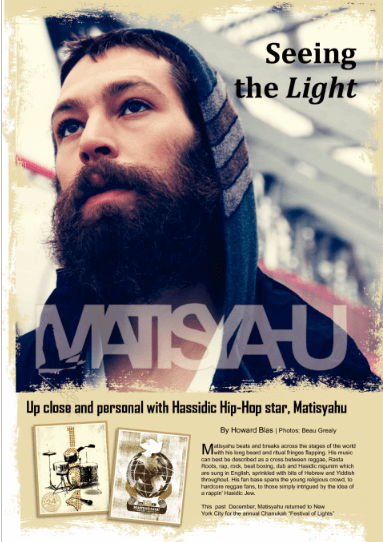
How is your new album, Light, different from your two previous albums?
What were some of your influences on this album? This album has been a progression, a continuation. I like to explore different genres, to write and to use my voice in different ways. I used a different method to write Light. I took more time and wrote it with different people. My friend in Israel, therapist and co-writer Ephraim Rosenstein and I studied and compared the teachings of the Alter Rabbi and Reb Nachman of Bratslav. Then we created the music, then the lyrics. I was in no rush – it took three years!
Your song, One Day, is the promo song for the 2010 Winter Olympics. How did that come to be? I don’t know! But I am happy they are using the song, and I have two shows there, one in Vancouver and one in Whistler (British Columbia).
What’s it like keeping Shabbat and kosher on the road? We have a tour with a full kitchen, and I have an assistant who cooks for me – breakfast and hot dogs! For Shabbat, we are wherever our tour takes us. We often just connect with the local Jewish community or Chabad. Sometimes, we are stuck at our hotel. At music festivals, we bring a Shabbos Team and create a Shabbat community!
Who are some of your musical influences? Bob Marley, Phish, Sizzla, OutKast.
You recently performed at Sultan’s Pool in Jerusalem. What are your thoughts on Israel and, what is it like performing the song Jerusalem in Jerusalem? Sultan’s Pool was a very special show. The fact that we were right there, just outside the Old City of Jerusalem, was very special and personally moving. For the last several years I have been going to Israel for Tishrei – to clean my plate and get focused. I think about my visit to Israel all year. I know I’ll be all over the world during the year, and staring off the year in Israel, making Israel the rosh is representative of something very special. And yes, it is awesome to sing my song Jerusalem in Jerusalem!
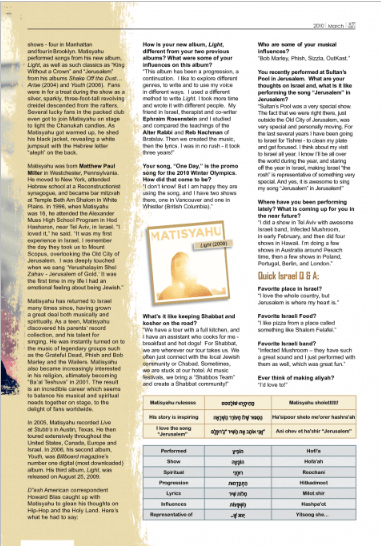
Where have you been performing lately? What is coming up for you in the near future? I did a show in Tel Aviv with awesome Israeli band, Infected Mushroom, in early February, and then did four shows in Hawaii. I’m doing a few shows in Australia around Pesach time, then a few shows in Poland, Portugal, Berlin, and London.
Favorite place in Israel? I love the whole country, but Jerusalem is where my heart is.
Favorite Israeli Food? I like pizza from a place called something like Shalom Felafel.
Favorite Israeli band? Infected Mushroom they have such a great sound and I just performed with them as well, which was great fun.
Ever think of making aliyah? I’d love to!
